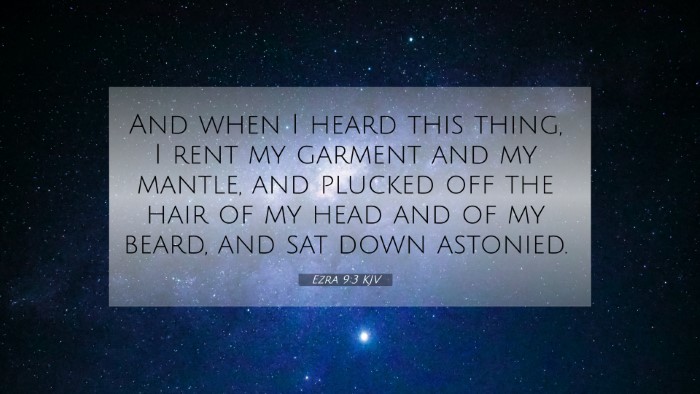Old Testament
Genesis Exodus Leviticus Numbers Deuteronomy Joshua Judges Ruth 1 Samuel 2 Samuel 1 Kings 2 Kings 1 Chronicles 2 Chronicles Ezra Nehemiah Esther Job Psalms Proverbs Ecclesiastes Song of Solomon Isaiah Jeremiah Lamentations Ezekiel Daniel Hosea Joel Amos Obadiah Jonah Micah Nahum Habakkuk Zephaniah Haggai Zechariah MalachiEzra 9:3 Similar Verses
Ezra 9:3 Cross References
And when I heard this thing, I rent my garment and my mantle, and plucked off the hair of my head and of my beard, and sat down astonied.
Uncover the Rich Themes and Topics of This Bible Verse
Listed below are the Bible themes associated with Ezra 9:3. We invite you to explore each theme to gain deeper insights into the Scriptures.
Ezra 9:3 Cross Reference Verses
This section features a detailed cross-reference designed to enrich your understanding of the Scriptures. Below, you will find carefully selected verses that echo the themes and teachings related to Ezra 9:3 KJV. Click on any image to explore detailed analyses of related Bible verses and uncover deeper theological insights.
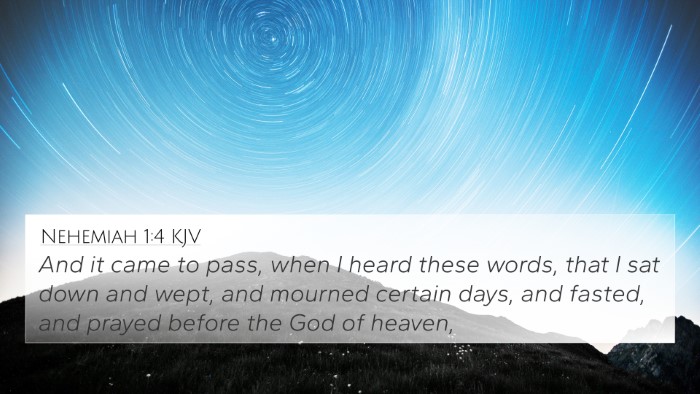
Nehemiah 1:4 (KJV) »
And it came to pass, when I heard these words, that I sat down and wept, and mourned certain days, and fasted, and prayed before the God of heaven,
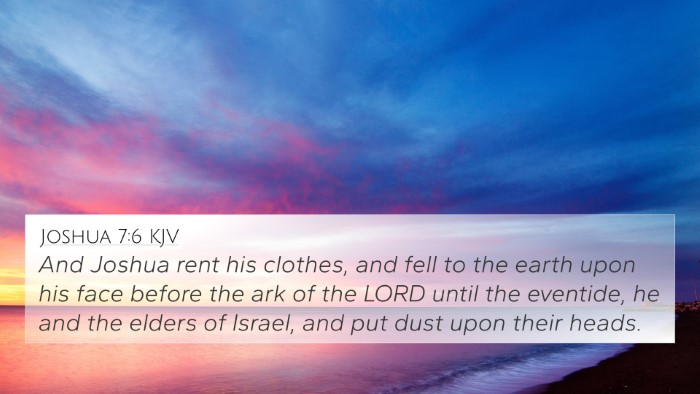
Joshua 7:6 (KJV) »
And Joshua rent his clothes, and fell to the earth upon his face before the ark of the LORD until the eventide, he and the elders of Israel, and put dust upon their heads.
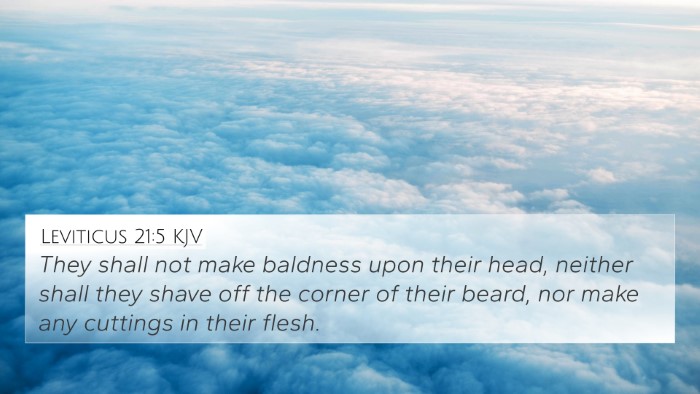
Leviticus 21:5 (KJV) »
They shall not make baldness upon their head, neither shall they shave off the corner of their beard, nor make any cuttings in their flesh.

Jeremiah 48:37 (KJV) »
For every head shall be bald, and every beard clipped: upon all the hands shall be cuttings, and upon the loins sackcloth.

Jeremiah 7:29 (KJV) »
Cut off thine hair, O Jerusalem, and cast it away, and take up a lamentation on high places; for the LORD hath rejected and forsaken the generation of his wrath.
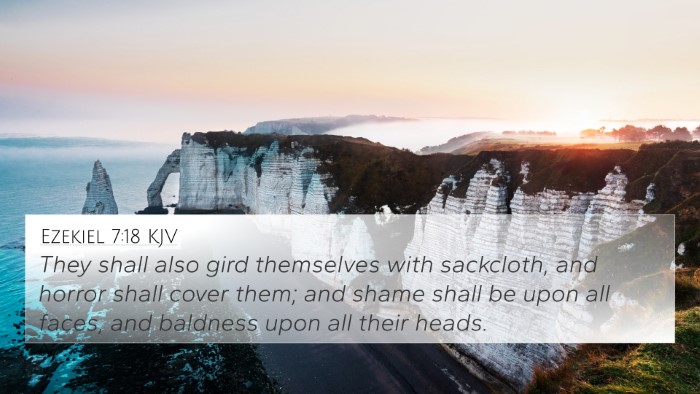
Ezekiel 7:18 (KJV) »
They shall also gird themselves with sackcloth, and horror shall cover them; and shame shall be upon all faces, and baldness upon all their heads.

Ezekiel 3:15 (KJV) »
Then I came to them of the captivity at Telabib, that dwelt by the river of Chebar, and I sat where they sat, and remained there astonished among them seven days.

Daniel 8:27 (KJV) »
And I Daniel fainted, and was sick certain days; afterward I rose up, and did the king's business; and I was astonished at the vision, but none understood it.

Daniel 4:19 (KJV) »
Then Daniel, whose name was Belteshazzar, was astonied for one hour, and his thoughts troubled him. The king spake, and said, Belteshazzar, let not the dream, or the interpretation thereof, trouble thee. Belteshazzar answered and said, My lord, the dream be to them that hate thee, and the interpretation thereof to thine enemies.

Jeremiah 36:24 (KJV) »
Yet they were not afraid, nor rent their garments, neither the king, nor any of his servants that heard all these words.
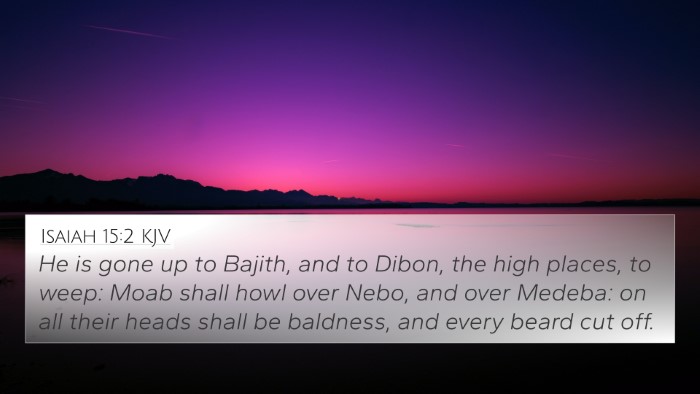
Isaiah 15:2 (KJV) »
He is gone up to Bajith, and to Dibon, the high places, to weep: Moab shall howl over Nebo, and over Medeba: on all their heads shall be baldness, and every beard cut off.

Psalms 66:3 (KJV) »
Say unto God, How terrible art thou in thy works! through the greatness of thy power shall thine enemies submit themselves unto thee.
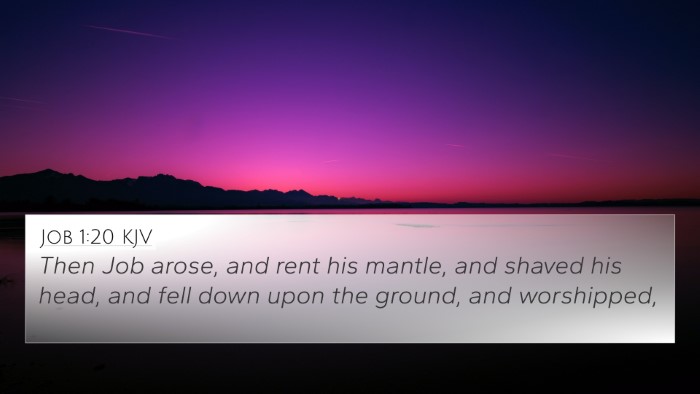
Job 1:20 (KJV) »
Then Job arose, and rent his mantle, and shaved his head, and fell down upon the ground, and worshipped,
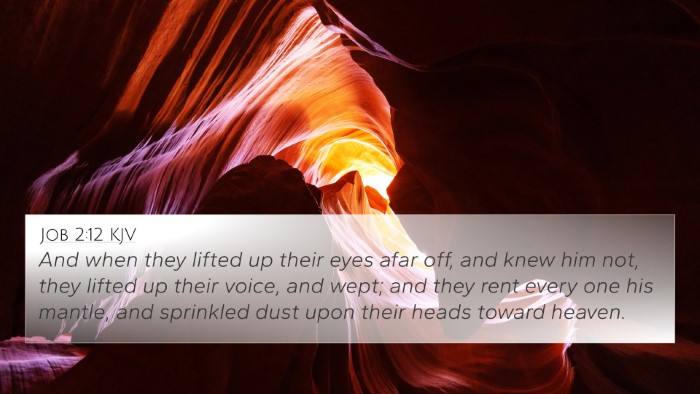
Job 2:12 (KJV) »
And when they lifted up their eyes afar off, and knew him not, they lifted up their voice, and wept; and they rent every one his mantle, and sprinkled dust upon their heads toward heaven.
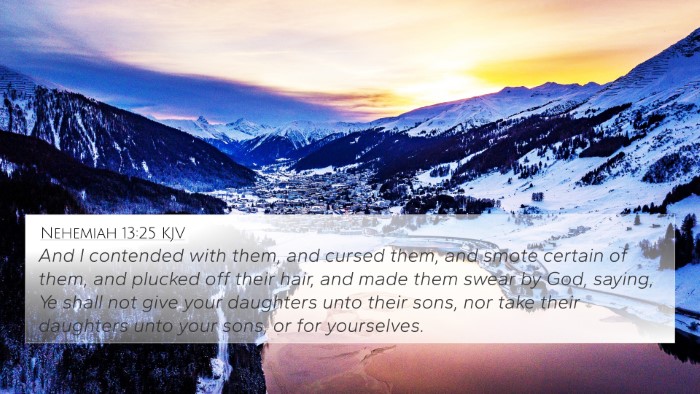
Nehemiah 13:25 (KJV) »
And I contended with them, and cursed them, and smote certain of them, and plucked off their hair, and made them swear by God, saying, Ye shall not give your daughters unto their sons, nor take their daughters unto your sons, or for yourselves.
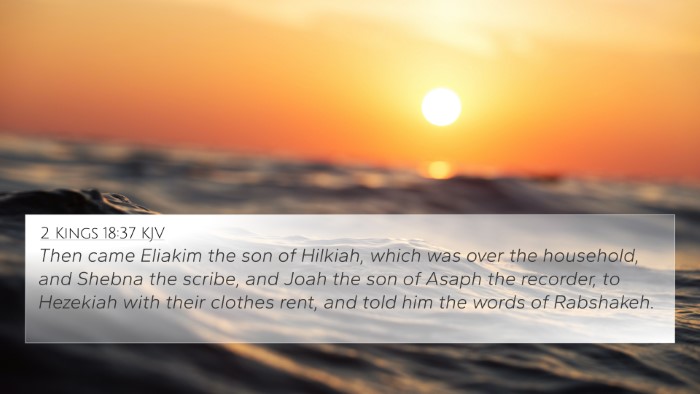
2 Kings 18:37 (KJV) »
Then came Eliakim the son of Hilkiah, which was over the household, and Shebna the scribe, and Joah the son of Asaph the recorder, to Hezekiah with their clothes rent, and told him the words of Rabshakeh.

Micah 1:16 (KJV) »
Make thee bald, and poll thee for thy delicate children; enlarge thy baldness as the eagle; for they are gone into captivity from thee.
Ezra 9:3 Verse Analysis and Similar Verses
Understanding Ezra 9:3
Ezra 9:3 states, "When I heard this, I tore my tunic and cloak, pulled hair from my head and beard and sat down appalled." This verse reflects a profound moment of grief and repentance for Ezra upon hearing the news of the Israelites’ unfaithfulness.
Meaning and Context
In this passage, Ezra reacts to the intermarriage of the Israelites with the surrounding nations, which he perceives as a severe violation of God’s commandments. His actions symbolize deep remorse and a commitment to purity among God’s people.
Commentary Insights
-
Matthew Henry:
Henry emphasizes Ezra's emotional response, likening his actions to the mourning practices of the time. Ezra's tearing of clothes symbolizes not only personal grief but also a corporate lamentation for the sins of the people, noting that sin should provoke such responses in God’s servants.
-
Albert Barnes:
Barnes discusses the significance of Ezra’s gestures, highlighting that in Jewish tradition, tearing one’s garments was a public sign of distress and repentance. He interprets Ezra's actions as a call to holiness, stressing the importance of remaining separate from worldly influences.
-
Adam Clarke:
Clarke analyzes the cultural context of Ezra's despair, pointing out that the act of pulling hair from his head and beard signifies utter revulsion and moral despondency. Clarke connects this event to the broader themes of covenant faithfulness and the consequences of disobedience.
Cross-References and Thematic Connections
Ezra 9:3 connects with several other scripture verses which highlight the themes of repentance, holiness, and the call to fidelity in relationships with God:
- Nehemiah 1:4: Nehemiah’s mourning for Jerusalem parallels Ezra’s grief for the people. Both show a deep concern for the spiritual condition of the Israelites.
- Lamentations 1:8: This verse expresses sorrow over the sins of Jerusalem, echoing Ezra’s lament for the unfaithfulness of the people.
- 2 Chronicles 33:12-13: The story of Manasseh’s repentance highlights restoration following a period of significant sin, illustrating God’s mercy.
- James 4:8-10: The New Testament call to draw near to God and humble ourselves resonates well with Ezra’s response of repentance.
- 1 Peter 1:15-16: The exhortation to be holy as God is holy weighs heavily in the context of Ezra's concerns about purity.
- 2 Corinthians 6:14: Paul’s admonition against being unequally yoked with unbelievers ties into Ezra’s worries about intermarriage.
- Psalm 51:17: The sacrifice God desires is a broken spirit, aligning with Ezra’s display of remorse.
- Isaiah 58:5: True worship involves genuine repentance, a theme that Ezra embodies through his actions.
- Hosea 10:12: The call to sow righteousness and reap mercy relates to the consequences of Israel’s actions and the importance of returning to God.
- Malachi 2:11: This verse warns against unfaithfulness in relationships and emphasizes the seriousness of covenant commitment.
Thematic Bible Verse Connections
This verse serves as a crucial link for those interested in exploring themes such as:
- Repentance: Understanding how genuine sorrow for sin can lead to restoration.
- Covenant Faithfulness: Investigating how God’s people are called to remain faithful to Him.
- Purity and Holiness: Delving into the necessity of maintaining spiritual purity in community.
Cross-Referencing Tools & Methods
For further study, readers may utilize various tools and methods for effective cross-referencing:
- Utilizing a Bible concordance can help locate related verses and themes quickly.
- Engaging in cross-reference Bible study helps to uncover deeper connections and insights.
- Employing a Bible cross-reference guide offers a structured approach to linking scriptures together.
- Using Bible reference resources can enhance understanding of complex themes such as covenant and repentance.
- Practicing inter-Biblical dialogue encourages deeper insight into how different parts of the Bible inform and enrich one another.


